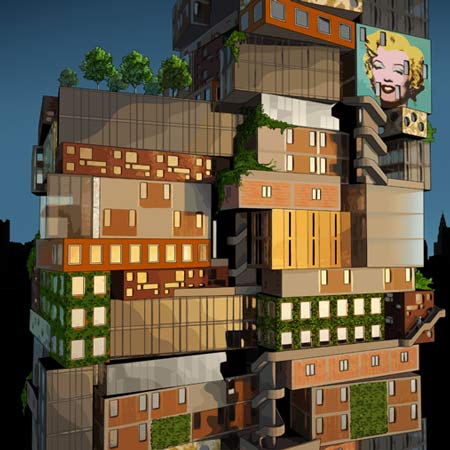
Alternative Design for MoMA Tower at 53 West 53rd by Axis Mundi
New York architecture and design practice Axis Mundi have designed a conceptual alternative to French architect Jean Nouvel's design for a 73-storey tower next to the Museum of Modern Art in New York (see our previous story).
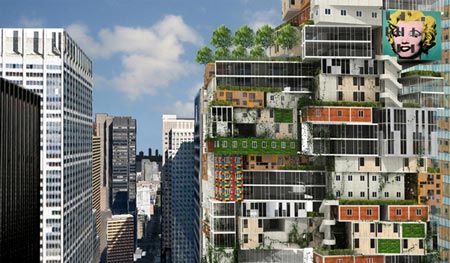
Axis Mundi's design is an attempt to rethink the New York skyscraper for the post-boom era, expressing the diversity of uses within instead of "one-note architecture that makes a singular visual image and little else."

The surface of the facade would be broken up by the varying depths of these residences, allowing for balconies and gardens.
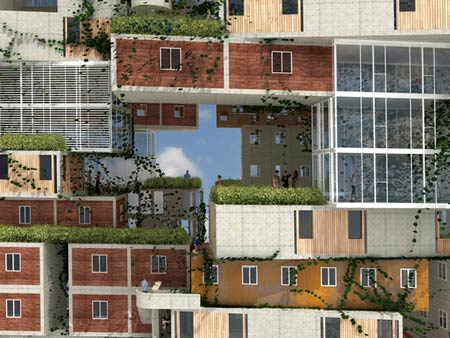
An arcade through the ground floor would connect W 53rd and W 54th Streets.
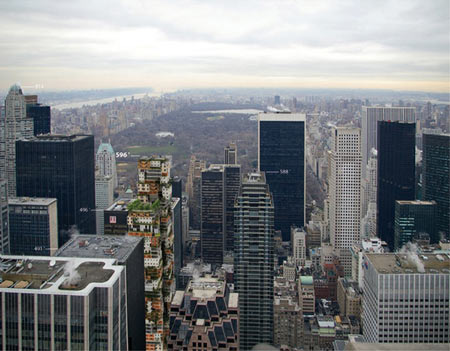
New galleries for the MoMA would occupy three floors above this, with a three-storey volume above the galleries set aside for community activities.
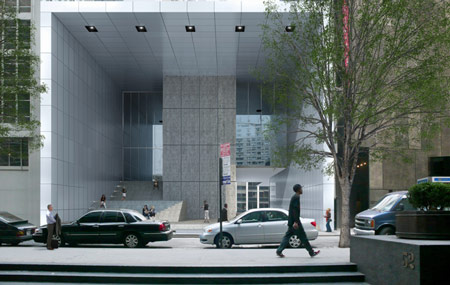
Here's some more information from Axis Mundi:
--
Axis Mundi Unveils Conceptual Alternative Design for MoMA Tower at 53 W 53
As the city takes stock in a post-boom era, architect John Beckmann sees this as the time to rethink the tall buildings that have become synonymous with New York City's identity.
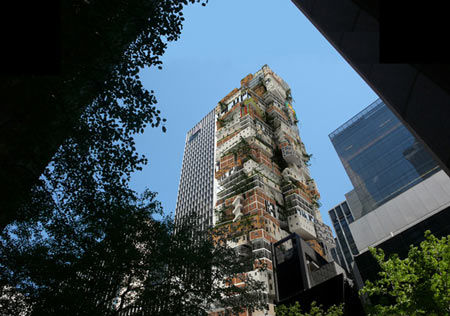
"Instead of disguising the rich potential of towers that have a mix of uses, we looked for a way to express that diversity," Beckmann noted. The firm used parametric computer-modeling software to test a wide range of possibilities. Out of this iterative process, Beckmann and his firm, Axis Mundi, proposes a new way to organize and express tall buildings: the Vertical Neighborhood.

"A more diverse, complex, heterogeneous, and environmentally minded city need no longer be represented on its skyline by one-note architecture that makes a singular visual image and little else," explained John Beckmann, the founder of Axis Mundi, a Manhattan-based architecture firm.
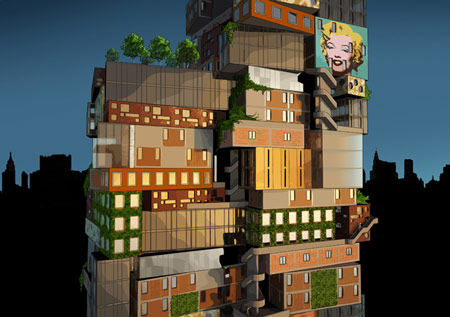
Rethinking Hines Tower Site
Beckmann proposes a conceptual alternative to business-as-usual, choosing the site of the proposed 53W53rd, among the city's largest skyscraper proposals in one of the most overbuilt parts of Midtown. Hines, the developer, engaged Paris architect Jean Nouvel, who designed an 82-story hotel and residential tower higher than the Chrysler Building. The site was purchased from the Museum of Modern Art with the proviso that the project would house additional gallery space for the museum.
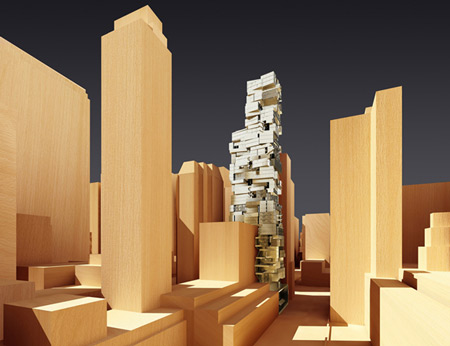
The Axis Mundi proposal is timely since the Hines MoMA tower is currently moving through the city's Urban Land Use Review Process (ULURP).
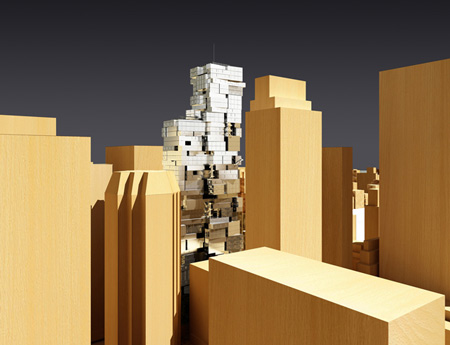
Flexible Floors, Open to Views
The architectural diversity Beckmann envisions starts with a double-ring, multi-level floor-plan unit, anchored by two cores that run the full height of the building, containing elevators, stairs and other vertical services.
The ring units called "SmartBlocks" make possible a wide variety of floor plans. Single-unit layouts can mix with duplex, or triplex layouts. The units can shift in and out, adding rich texture to the surface, creating vertical garden space, and linking the units in unique ways.
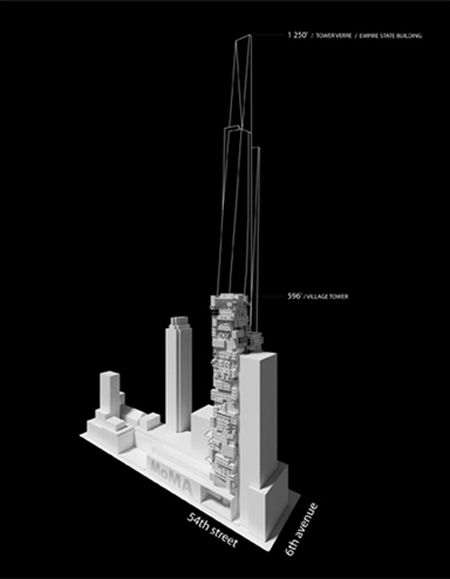
The malleability of the ring units accommodates living and working, extended families, and new forms of tenancy and ownership. Any grouping of these could be purposed for a hotel. The building is enriched by the multiplicity of forms and textures people create within their vertical neighborhoods.
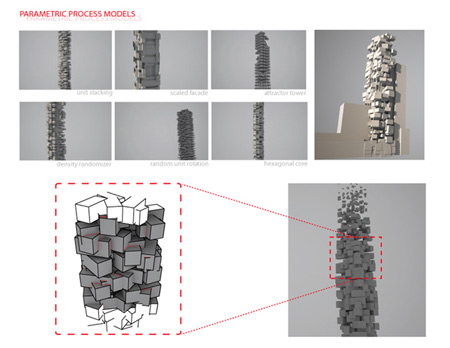
By varying the mix of the floor plan units, the Axis Mundi design leaves space for vertical fissures that move irregularly up the tower. These bring light and breezes into the open centers of the double-ring units and frame spectacular, theatrical vistas to the city through the building's own structure. Neighbors can see and greet each other along spacious bridges and balconies rather than scurry by each other in long, dark hallways.
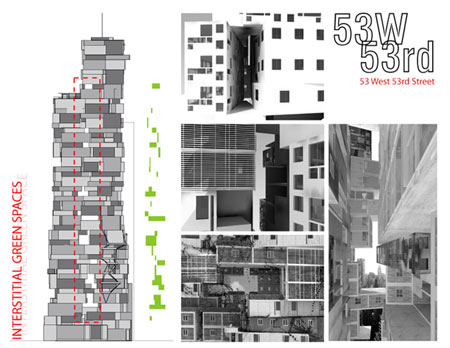
Fitting In With Porous, Richly Variegated Surface
"Historically, the skyscraper was a unitary, homogeneous form that reflected the generic, flexible office space it contained," Beckmann says. "The Vertical Neighborhood is more organic and more flexible--an assemblage of disparate architectural languages. It reflects an emerging reality for tall buildings as collections of domestic elements: dwellings, neighborhoods, streets."
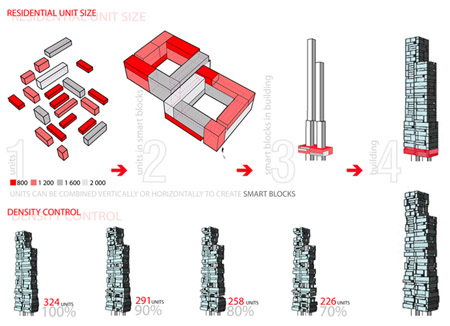
Axis Mundi has conceived the tower at a scale akin to, rather than dramatically exceeding, the heights of this very densely built-up Midtown neighborhood. The richly modeled surface and the fissures of space help to reduce the structure's apparent scale and join it more seamlessly to a neighborhood that mixes offices and residential towers, brownstones, apartment buildings, hotels, and clubs.
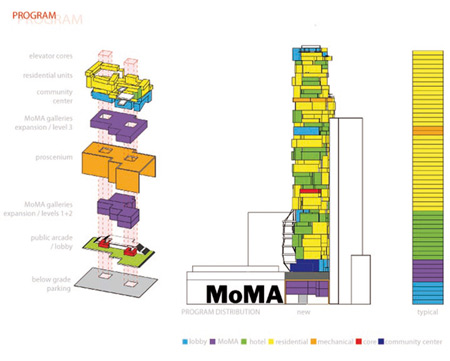
A dramatic through-block public arcade connects W. 53rd and W. 54th streets, offering access to new MoMA galleries on up to three levels above. Contiguous with the museums' existing exhibit space, the galleries twine back on themselves, like a Möbius strip.
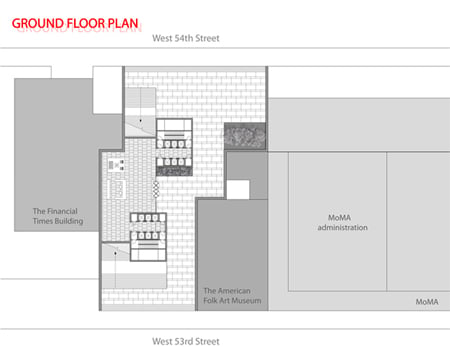
Above that, Axis Mundi sets aside a three-story-high volume that can be developed as a community-gathering space. Their proposal seeks to inform the discussion of it and other tall buildings. "The design reinforces the urban identity of tall buildings," observes Beckmann. "It suggests new expressive possibilities in an urbanism of difference rather than of homogeneity.
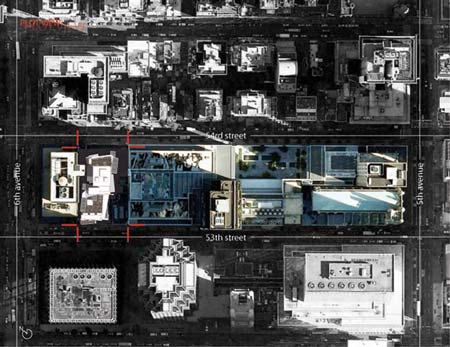
In a city where more than 300 languages are spoken, architecture can celebrate that diversity rather than see it as a problem that must be solved."
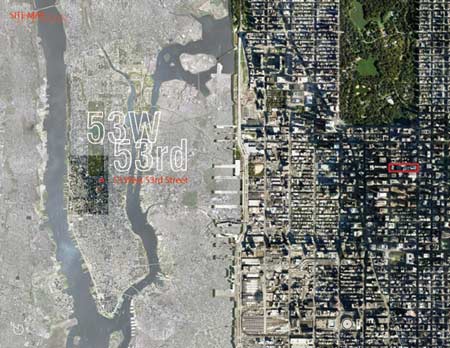
Height: approx. 600 ft
Floors: 50 above (2 below)
Building Footprint: 17,000 square feet
MoMA Expansion Galleries: 32,500 square feet
Axis Mundi is an interdisciplinary architecture and design firm based in New York City. (www.axismundi.com)
Concept and Lead Designer: John Beckmann
Design Team: John Beckmann, CarloMaria Ciampoli, James Coleman (LAN), Nick Messerlian, Richard Rosenbloom, Margaret Janik, Pauline Marie d'Avigneau, and Taina Pichon
Parametric modeling: CarloMaria Ciampoli, James Coleman (LAN)
Renderings: Orchid 3D
Illustration: Michael Wartella